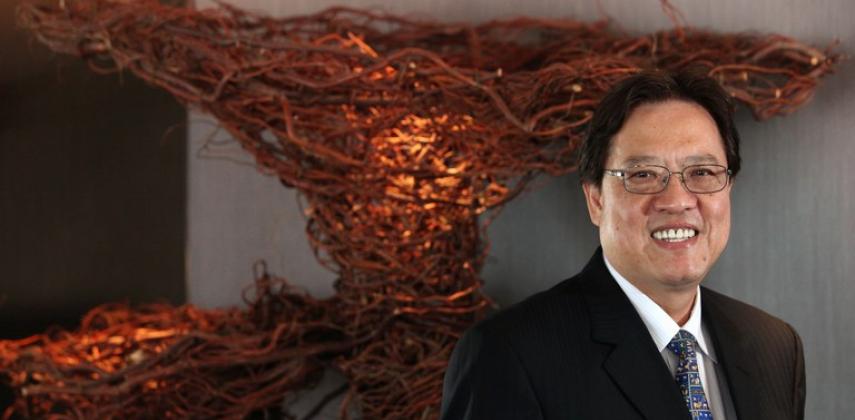Born on the mainland but raised in Hong Kong, Miguel Ko, chairman and president, Asia-Pacific, Starwood Hotels and Resorts Worldwide, Inc has spent the majority of his career in the hospitality industry. From 1979 until 1992, Ko served in increasingly senior positions within ITT Sheraton Corporation including president of ITT Sheraton Asia-Pacific Division. He also spent seven years (1992-1999) as president Asia-Pacific at Pepsi-Cola International where he oversaw the soft drink company’s brand building efforts in China, Vietnam, Philippines and Thailand.
In his present role, Ko is responsible for the strategic oversight of the operating and financial performance of 150 hotels and resorts with more than 50,000 rooms and 45,000 associates in 21 countries in Asia-Pacific. Prior to this appointment, Ko was deputy chairman and CEO of CDL Hotels International. The recipient of several major industry awards, including Visionary Leader of the Year in 2007 awarded by Travel Weekly, Ko is widely recognised for his Asia Pacific, tourism and hospitality knowledge. He talks to Chris Davis.
What does your current role involve?
As a global company, my time is focused on overseeing strategy and sustainability and helping Starwood to develop and expand. There is a lot happening in the Asia region where we the largest upper-upscale hotel company. My work also includes spending time with high potential people we have identified across the organisation as future managers and leaders of the business.
How would you describe your style of leadership?
I operate on a high-trust model. My job is to pick the best people to run the business within the culture and operating parameters of the organisation. I include myself when I say I expect the highest level of integrity to generate business results, which includes how the company is viewed and not limited to financial performance.
In your career, which experiences taught you most about leadership?
Personally, I feel a key leadership attribute is the ability to observe and listen. I learnt this when I was very young as a new arrival in Hong Kong from China. I spoke no Cantonese or English but soon learnt the quality of listening and watching. I am still like a sponge. I watch others and try to pick up the best ideas, which can include learning from bad leaders as well as good leaders.
How do you unlock the creativity of a team of executives?
As a caring organisation, our people are encouraged to express themselves and initiate ideas providing they fit within the guidelines of the business. From grass roots up, creativity and innovation is encouraged. We ensure that people responsible for creative ideas are recognised and rewarded.
How difficult is it to build loyalty when so many people are conditioned to think short term only?
Loyalty is without doubt a two way street. It begins by hiring the right people whose career aspirations are aligned with the company. At the same time, it is not appropriate to expect loyalty from employees without an organisation showing loyalty. For example, running a business that is performance based and employees are promoted on merit. My leadership team averages over 20 years with the company, which to me speaks volumes about loyalty.
What would you do to make meetings and committees more productive?
I am not a great believer in holding too many meetings, but when I do, I like them to be short, concise and to the point. Meetings should be used to discuss solutions and solve problems and not occasions for bosses to pontificate.
When facing business problems, where do you turn for advice and inspiration?
My wife and a few learned friends are my first line of defence when I need to discuss a problem. My wife and friends have the ability to step back from the situation further than I do. If time allows, I like to reflect on a situation. Preferably, I like to sleep on a problem before I make a decision and this way I can clear my vision so I am more objective and less guided by emotion.
Which three broad themes will be most important for the business world in the next decade?
The most overarching theme is true globalisation. There are few businesses that can afford to take a single country view when clients, human resources and supplies originate from all over the world. Businesses must align strategies to consider this.
Businesses also need to recognise the power of the Internet and its impact on buying, selling, recruiting and training. Additionally, companies cannot afford to ignore the growing influence of generation ‘Y’. This includes the way they look at the world, what they want to buy and the way they want to run organisations and be managed as employees.
At the Singapore Human Summit held last month I spoke about how globalisation of young Asian enterprises is changing workforce profiles and the new leadership and HR capabilities required to meet new challenges on this topic.
Nowadays, what should young people focus on if they want to succeed in the hospitality profession?
Young people have a much better start these days through better education and tend to be more worldly wise because of the Internet, but they still need to be prepared to take a long-term view towards developing their career. There is no replacement for working hard, being dedicated and passionate about what you do. These are attributes that define the difference between an okay hospitality manager and a great manager.
Industry leader
- Ko used his extensive tenure in the hospitality industry to expand and develop hotels and resorts under the Starwood brand
- He is acknowledged for his insights into the Asian hospitality industry and often invited to comment as an industry leader
- He encourages staff to be creative without fear of failure or repercussions


